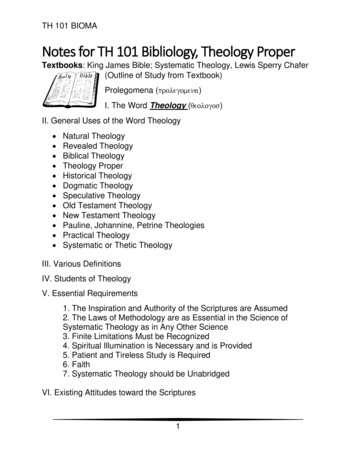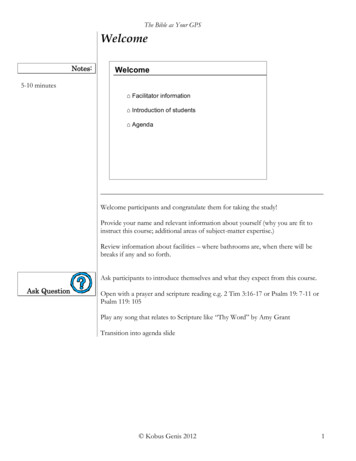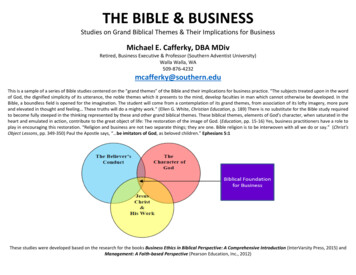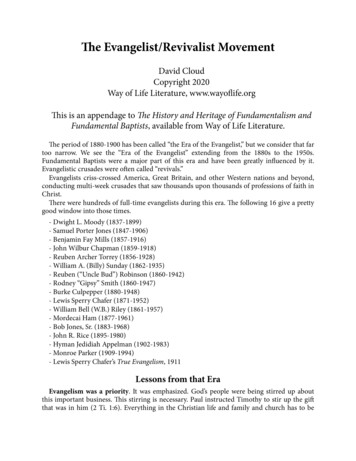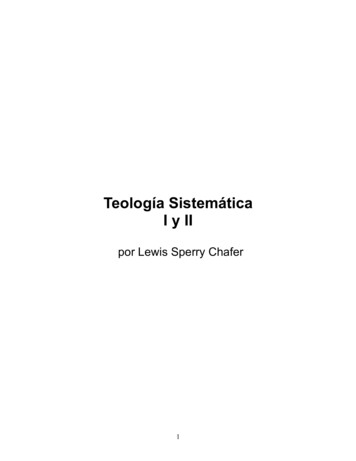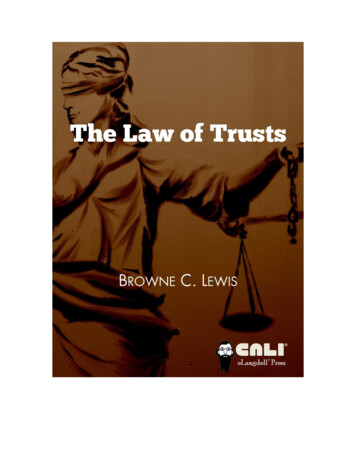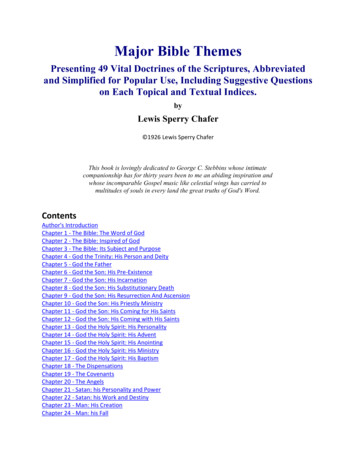
Transcription
Major Bible ThemesPresenting 49 Vital Doctrines of the Scriptures, Abbreviatedand Simplified for Popular Use, Including Suggestive Questionson Each Topical and Textual Indices.byLewis Sperry Chafer 1926 Lewis Sperry ChaferThis book is lovingly dedicated to George C. Stebbins whose intimatecompanionship has for thirty years been to me an abiding inspiration andwhose incomparable Gospel music like celestial wings has carried tomultitudes of souls in every land the great truths of God's Word.ContentsAuthor's IntroductionChapter 1 - The Bible: The Word of GodChapter 2 - The Bible: Inspired of GodChapter 3 - The Bible: Its Subject and PurposeChapter 4 - God the Trinity: His Person and DeityChapter 5 - God the FatherChapter 6 - God the Son: His Pre-ExistenceChapter 7 - God the Son: His IncarnationChapter 8 - God the Son: His Substitutionary DeathChapter 9 - God the Son: His Resurrection And AscensionChapter 10 - God the Son: His Priestly MinistryChapter 11 - God the Son: His Coming for His SaintsChapter 12 - God the Son: His Coming with His SaintsChapter 13 - God the Holy Spirit: His PersonalityChapter 14 - God the Holy Spirit: His AdventChapter 15 - God the Holy Spirit: His AnointingChapter 16 - God the Holy Spirit: His MinistryChapter 17 - God the Holy Spirit: His BaptismChapter 18 - The DispensationsChapter 19 - The CovenantsChapter 20 - The AngelsChapter 21 - Satan: his Personality and PowerChapter 22 - Satan: his Work and DestinyChapter 23 - Man: His CreationChapter 24 - Man: his Fall
Chapter 25 - Sin: Its Character and UniversalityChapter 26 - Sin: God's Remedy for itChapter 27 - Law and GraceChapter 28 - Salvation from the Guilt and Penalty of SinChapter 29 - Salvation from the Power of SinChapter 30 - Four Aspects of RighteousnessChapter 31 - Sanctification 1Chapter 32 - Sanctification 2Chapter 33 - SecurityChapter 34 - AssuranceChapter 35 - The Church: Her MembershipChapter 36 - The Church: Her MissionChapter 37 - The SabbathChapter 38 - The Lord's Day and the New CreationChapter 39 - LoveChapter 40 - PrayerChapter 41 - ServiceChapter 42 - ThanksgivingChapter 43 - StewardshipChapter 44 - Prophecy in the Old TestamentChapter 45 - Prophecy in the New TestamentChapter 46 - Judgment of the Believer's WorksChapter 47 - Judgment of the NationsChapter 48 - Judgment of the WickedChapter 49 - The Eternal Estate of the Redeemed[Top]Author's IntroductionMuch of the material in this book was published in the Sunday School Times (April to December,1925) as the author's notes on the Whole Bible Lessons. Since the original series was incomplete as arepresentation of the more important doctrines of the Scriptures, several Chapters have been added.Those Chapters which were originally written as Bible class lessons are outlined and named accordingto the direction given by the lesson committee and are based on the Scripture selections suggested bythem.This book is in no sense intended to be a treatise on systematic theology. In its preparation, a limitednumber of the most vital and practical themes have been chosen, and an attempt has been made toadapt these brief discussions to the needs of the untrained Christian.To each Chapter a list of questions has been added which, it is hoped, may make the studies moreuseful both to individuals and to groups. The student who would be versed on these subjects shouldlook up every passage cited and continue the study of each theme until all the questions can beanswered from memory.Although the writer presumably has made a careful study of the various subjects treated, it is not hisprerogative to dictate what another shall believe; but rather to point out what the Bible teaches. Faithshould always rest on a personal understanding of the Scriptures, rather than on the teaching of men.
Bible doctrines are the bones of revelation and the attentive Bible student must be impressed withthe New Testament emphasis on "sound doctrine" (Matthew 7:28; John 7:16, 17; Acts 2:42; Romans6:17; Ephesians 4:14; 1 Timothy 1:3; 4:6, 16; 6:1; 2 Timothy 3:10, 16; 4:2-3; 2 John 1:9-10). Not knowingthe doctrines of the Bible, the child of God will be, even when sincere, "tossed to and fro, and carriedabout with every wind of doctrine, by the sleight of men and cunning craftiness, whereby they lie inwait to deceive"; the many well-meaning believers who are drawn into modern cults and heresies beingsufficient proof. On the other hand, the divine purpose is that the servant of Christ shall be fullyequipped to "preach the word; be instant in season, out of season; reprove, rebuke, exhort with alllongsuffering and doctrine."These Chapters are released with the prayer that they may honor Him whose glory and grace aresupreme, and that some among the children of God may be helped more accurately "to speak thethings which become sound doctrine."—Lewis Sperry Chafer[Top]Chapter 1 - The Bible: The Word of GodIt is a marvelous thing that we have an infallible Book from the hand of God. Every student andteacher should be fully convinced of this fact. There are two lines of evidence to be traced: (1) Thatwhich is internal, or the Bible's own claim concerning itself, and (2) that which is external, or outward,obvious facts concerning the Scriptures.I. That Which is InternalBy hundreds of passages the Bible both directly declares and assumes itself to be the Word of God(note Psalm 12:6; 93:5; 119:18, 98, 99, 100, 105, 130; Isaiah 55:10, 11; Jeremiah 23:29; Romans 10:17;2 Timothy 2:15). Psalm 19:7-11 declares that the Old Testament is the Word of Jehovah. Six perfectionsof that Word are named with six corresponding transformations which that Word accomplishes.Likewise, Hebrews 1:1, 2 states that God is speaking in the Old Testament through the prophets and inthe New Testament through His Son.II. That Which is ExternalConsidering the external evidence that the Bible is the Word of God, the Book is a phenomenon andas such presents a challenge to the most skeptical among men. Certain facts should be noted:1. Its ContinuityThe Bible appears in one volume in which there is a perfect continuity of historical sequence from thecreation to the new heavens and the new earth; a perfect unfolding of doctrine from the blade to thefull corn in the ear; from type to antitype; from prophecy to its fulfillment; and the anticipation,presentation, realization, and exaltation of the most perfect Person on earth or in Heaven. Yet this onevolume which exhibits the most perfect continuity of thought that the world has ever seen is,nevertheless, a collection of sixty-six books written by about forty authors—kings, peasants,philosophers, fishermen, physicians, statesmen, scholars, poets, and plowmen—who could have knownbut little of each other, since their lives were lived in various countries and their writings weredistributed over sixty generations of human history, representing a period of about sixteen hundredyears.
2. The Extent of its RevelationIn its unfolding of truth, the Bible is inexhaustible. Like a telescope it sweeps the universe from theheights of Heaven to the depths of hell, and traces the works of God from their beginning to their end.Like a microscope it reveals the minutest details of the plan and purpose of God and the perfection ofHis creation. Like a stereoscope it places all beings and objects whether on earth or in Heaven in rightrelation the one to the other. Though written in the earlier days of human knowledge when the presentworld discoveries could not reasonably have been disclosed, it is in harmony with every discovery madeby man.3. Its Output.In fullest satisfaction the Bible is claimed by all races as their own, and is, as no other book,translatable into every tongue. It has already been translated into over seven hundred and seventydifferent languages and dialects. Thirty societies are now specializing in its publication, and over thirtymillion copies are printed annually. Of this number the British Bible Society publishes every hour morethan two thousand copies. The French infidel Voltaire who died in 1778 predicted that the Bible wouldbecome obsolete within a hundred years. Contrary to the statement of this skeptic, the Bible abides.For nineteen hundred years it has endured the systematic, destructive attacks from Satan and men; butnever has its predicted endurance been more tested than now when those who pose as its friends andexponents are subtly denying its most vital truths and its supernatural character. Its influence istransforming. To the unsaved it is the "sword of the Spirit" (Ephesians 6:17), and to the saved it is acleansing, sanctifying, and reflecting power (Ephesians 5:25, 26; John 17:17; 2 Corinthians 3:18); it is thebasis of all true civilization, law, and morality.4. Its Subject MatterThe supernatural character of this Book is seen in the fact that it deals as freely with the unknown andotherwise unknowable as it does with that which is known, and those who follow its teachings areunfailingly led in the paths of God's eternal Truth. Likewise, as no other book, the Bible accounts forthose who do not receive its teachings. Of them it records that they are unregenerate men who receivenot the things of the Spirit of God, neither can they know them because only by the Spirit are thesethings discerned (1 Corinthians 2:13). Its qualities are real, for those who know it best love it most.5. As LiteratureMerely as literature, the Bible is supreme. It satisfies the simple-minded and entrances the sage; yethere, again, consideration should be given to the limitations of its human authors. To God alone be theglory!6. Unprejudiced AuthorityThis Book is not prejudiced in favor of men. It unhesitatingly records the sin, the weakness of the bestof men and the doom of all who rely alone on those virtues and merits which are their own. Men do notso speak of themselves. It assumes to be a message from God to man rather than a message from manto man. It speaks with authority of things in Heaven and things on earth; of the seen and of the unseen;of God, of angels, and of men; of time and of eternity; of life and of death; of sin and of salvation; ofHeaven and of hell. Apart from its message, there is no knowledge of these eternal issues in all theworld: with its message, there is certainty, assurance, and peace.7. The Supreme CharacterAbove all else in this supernatural Book is its revelation of the Person and glory of God as manifestedin His Son. Let no one suppose that this Character is a mere fiction—the invention of a mortal mind; for
His perfections have never been comprehended by the wisest and holiest of this earth. If He were amere fiction, let the mind which conceived Him be extolled and adored!8. The Bible and Christ ComparedBecause of the combination of supernatural qualities which enter into the Bible, a similarity may beobserved between the Bible as the Written Word and the Lord Jesus Christ as the Living Word. They areboth supernatural as to their origin, presenting an inscrutable and impeccable blending of that which isdivine and that which is human. They both exercise a transforming power over those who believe, andare alike allowed of God to be set at naught and rejected by those who do not believe. The untainted,undiminished divine perfections are embodied in each. The revelations which they disclose are at onceas simple as the demands of a child, as complex as the infinite treasures of divine wisdom andknowledge, and as enduring as the God whom they reveal.Questions1. What are the two general lines of evidence that the Bible is the Word of God?2. Name six transformations it accomplishes as stated in Psalms 19:7-11.3. Since the Bible was written by so many different authors and in various ages, how do youaccount for its marvelous continuity?4. Recount the various classes of men who are the human authors.5. Does the Bible revelation conflict with modern discoveries?6. To what extent is the Bible being circulated?7. What was Voltaire's prediction in 1778?8. Has the Bible ever been more assailed by its enemies than now?9. Under what limitation did the Old Testament prophets write concerning the advent of Messiah?10. What does it say of the limitation of man?11. What is peculiar about its literary appeal?12. What evidence is suggested by the fact that the Bible discloses the sins of all men?13. What character is its supreme revelation?14. Indicate the outstanding similarity between Christ and the Scriptures.[Top]
Chapter 2 - The Bible: Inspired of GodThe Bible rightfully assumes to be God's message to man. The books of the world assume to be nomore than man's message to his fellow-man. The Bible therefore deals with things eternal, infinite, andotherwise unknowable as freely as other books deal with things temporal, finite, and known. In formingthe Scriptures, it is true that God employed human writers, but these men, though they may haveunderstood but little of the whole to which they were contributing, did nevertheless, under the mightyhand of God, produce a single Book in which there is infinite continuity and which manifests everyevidence of being the work of one Writer who alone is its Author.The true doctrine of inspiration contends that God so directed the human authors that, withoutdestroying their own individuality, literary style, or personal interest, His complete and connectedthought toward man was recorded. Various opinions have been advanced as to the extent of the divinecontrol over the human authors. These have been called "theories of inspiration," and all students ofthe Bible should be clear in their own minds with regard to these vital issues.I. General Theories of Inspiration1. Naturalistic.—This, as the name implies, is the theory that the Bible is only a human product andtherefore void of any supernatural elements. This view, which discredits and degrades the Word of God,is held only by infidels and unregenerate men.2. Partial.—By this term a theory of inspiration is indicated which suggests that only certain parts of theScriptures, are inspired. When this theory is accepted, of necessity each person is left to determine forhimself what portions of the Bible are inspired and what are not. All authority is broken down sincepeople are not naturally inclined to receive and apply to themselves those words of reproof andcorrection which are contrary to their own wishes. Those who hold this theory usually make much ofthe words of Christ as being more authoritative than other portions of the Scriptures; disregarding thefact that Christ wrote nothing and that His words are, at best, the report of the very men whosewritings they, in other connections, discredit.However, it should be remembered that Christ declared His own acceptance of every word of the OldTestament to be the Word of God, and that He provided for the full authority of every word of the NewTestament.3. Gracious.—This theory of inspiration suggests that the writers of the Bible were inspired in the sameway, though to a fuller degree, as Spirit-filled men are empowered today. The writings of the ApostlePaul are said to be comparable with the writings of John Calvin or Martin Luther, and equally liable tobe marred by human error. This and the "Partial" theory of inspiration are the theories which are heldby Modernists today.4. Verbal.—This theory, as its designation implies, maintains that the Bible is, even to its very words, aninspired book. This claim is made for the original writings only and not for copies, translations, orquotations, even though they may date back to the early days of the Christian era. However, though nooriginal manuscripts are now in existence, it is important to observe that the most careful study ofthose copies, translations and quotations which are available yields clear evidence that our present textof the Bible is a very close reproduction of the original.
It is sometimes claimed that it was not the very words but the thought, or concept, which wasinspired. The sufficient answer to this suggestion is that, apart from the, exact words, there could be noprecision in a mere conception, particularly such precision as is demanded in the Scriptures. So, also,the declaration of the writers who knew the facts is that they were responsible for words rather thanthe mere concept (note Moses, Exodus 34:27; David, 2 Samuel 23:2; Psalm 45:1; Solomon, Prov. 30:6;Isaiah, Isaiah 6:5-8; Jeremiah, Jeremiah 1:7; 36:1, 2; Zechariah, Zechariah 7:7, Christ, Matthew 8:17;John 14:10; 8:47; 12:48; 17:8; Paul, 1 Corinthians 2:4; Jude, Jude 1:17, 18: R.V.) Nor does the Bible'sown claim to be inspired, even in its very words, limit the choice of words or the flow of style on thepart of the human writers, for God is abundantly able to secure the exact expression He demands evenwithin the literary limitations of a fisherman.II. The Testimony Of ChristBeyond its own claims, the Old Testament was declared by Christ to be the inspired Word of God.When He spoke, none of the New Testament had been written, therefore He could have referred onlyto the Old Testament (John 17:17). Likewise, the New Testament was written according to His provisionand promise. He had said that He would leave a revelation and that it would be completed after Hisdeparture (John 16:12, 13). This revelation was committed to Certain men (John 15:27; Acts 1:8;Matthew 28:19; Luke 10:22), and He gave their words the same authority as His own (Matthew 10:14,15; Luke 10:16; John 13:20; 17:14, 18; Hebrews 2:3, 4).III. Two Important Passages1. "All scripture is given by inspiration of God" (2 Timothy 3:16). The word which is here translatedinspiration is used but once in the New Testament. It means "God-breathed," and, according to thisverse, this divine element extends to all the Scriptures.2. "Holy men of God spake as they were moved by the Holy Ghost." (2 Peter 1:21). The phrase, "movedby the Holy Ghost," is the vital element in this revelation and its literal meaning is that the writers were"borne along" by the Spirit of God. Such is the Bible's own claim to inspiration.IV. Qualifying Considerations1. Inspiration provides that the exact divine message be given. If it is God's Truth which is reported, it isrecorded exactly. If it is Satan's lie, it is presented as a lie, for inspiration does not change a lie intotruth. If it is history, it is true to the facts. If it is prophecy, it indicates precisely what will come to pass.2. Inspiration aims at inspired writings and not at inspired men. The very infallible Scriptures themselvesrecord the sins and failures of the human authors.3. Since we depend upon the Bible alone for the knowledge of the most vital facts of our existence,there is every reason to contend for the divine accuracy of God's Word and to be grateful that it is"God-breathed" and therefore not merely as fallible as its human writers, but is as infallible as its divineAuthor.Questions1. Wherein does the Bible assume to be God's message to man?2. For what does the doctrine of Inspiration contend?
3. Define the Naturalistic Theory of Inspiration.4. Define the Partial Theory of Inspiration.5. Define the Gracious Theory of Inspiration.6. Define the Verbal Theory of Inspiration.7. Why is it that inspiration cannot be limited to the thought or concept?8. What theory of inspiration does the Bible claim for itself?9. Indicate Christ's attitude toward the inspiration of the Old Testament Scriptures.10. State the meaning of the word inspiration as used in 2 Timothy 3:16 and of the words moved bythe Holy Ghost as used in 2 Peter 1:21.11. Indicate the effect of inspiration on the recorded words of God, of Satan, of men, of history, andof prophecy.12. Does inspiration aim at inspired men or inspired writings? What proof can be given for youranswer?[Top]Chapter 3 - The Bible: Its Subject and PurposeRevelation from God is reasonable. In the presence of the fact of the material universe, a belief in asufficient Creator is demanded of all rational beings. And, having recognized the Creator and man as theconsummation of creation, it is reasonable to expect that the Creator will communicate with thecreature, revealing His purpose and will. God the Creator has done this having revealed Himself invarious ways:1. Through Nature.—The eternal power and Godhead, we are told are revealed by the things which arecreated (Romans 1:20), but, while the revelation is limited in that it discloses nothing of those divineattributes which have to do with redemption and the destiny of men, it is sufficient to the extent thatthe heathen world is without excuse if they do not recognize that there is a God.2. In Christ.—In the fullness of time (Galatians 4:4), God became manifest in the flesh. The Son of Godcame into the world to declare God to men in terms of human understanding. By His incarnation,otherwise inscrutable facts concerning the eternal God have been translated into the limited range ofhuman comprehension. This revelation contemplates not only the Person and power of God which wasalready set forth to a limited degree in the things created, but more particularly the love of God as setforth in the sacrificial death of Christ. Christ is an exact portrait of God (Hebrews 1:3), and we shouldalways consider Christ as God manifest in the flesh (1 Timothy 3:16).3. The Written Word.—This Chapter has to do with the written Word as a manifestation. The Bible notonly presents God as its supreme subject, but also unfolds His purposes. The written revelation isall-inclusive. It not only restates all the facts concerning God which are revealed through nature, and
gives the only record concerning God's manifestation in Christ, but it enlarges the divine revelation intoinfinite detail regarding God the Father, the Son, the Spirit, angels, demons, man, sin, salvation, grace,and glory. In recognizing the unique character of the Bible, two things especially noted in the title of thisChapter may be emphasized:I. The Purpose Of The BibleWe understand from the written Word of God that there is one supreme purpose which actuates Godin all He has done or will do from the beginning of creation to the farthest reaches of eternity whether itis in Heaven or on earth. For this one purpose angels were created; so, also, the material universe andman, and, though hidden behind an inscrutable mystery, we know that even sin was permitted andredemption was provided with a view to the realization of this supreme purpose. This supreme purposeis the Glory of God.That God should bring all things to pass that He might be glorified would seem self-seeking to aninfinite degree, from a mere human view-point; but this theme cannot be limited to the range of humanconceptions. In the light of Scripture revelation, we conclude that because God is infinite in His being,His perfections, and His blessedness He is worthy of infinite glory, and it would be an injustice of infiniteproportions should His creation withhold from Him that honor and glory which are rightfully His.God is not self-seeking; He who is the fountain source of all truth must be true to Himself as Creatorand Lord of all. It is man who is self-centered and who can conceive of nothing more desirable than thatman should be exalted and glorified. It is man who does not understand the normal relation whichshould exist between the Creator and the creature, and does not ascribe to the Creator that glory whichis rightfully due Him because of His person, His position, and His character (Exodus 24:10, 17; 1Chronicles 16:17-29; Psalm 57:11; Isaiah 6:1).Since the Bible is God's message to man, its supreme purpose is His supreme purpose; which is, thatHe may be glorified. The Bible records:1. That "all things. that are in heaven, and that are in earth, visible and invisible, whether they bethrones, or dominions, or principalities, or powers: all things were created by him, and for him" (for hisglory, Colossians 1:16). Angels and men, the material universe and every creature, are all created for Hisglory. "The heavens declare the glory of God" (Psalm 19:1).2. The nation Israel is for the glory of God (Jeremiah 13:11; Isaiah 43:7, 21, 25; 60:1, 3, 21; 62:3).3. Salvation is unto the glory of God (Romans 9:23), even as it will be a manifestation of the grace ofGod (Ephesians 2:7), and is now a manifestation of the wisdom of God (Ephesians 3:10).4. All service should be unto the glory of God (Matthew 5:16; John 15:8; 1 Corinthians 10:31; 1 Peter2:12; 4:11, 14). The Bible itself is God's instrument by which He prepares the man of God unto everygood work (2 Timothy 3:16-17).5. The Christian's new passion is that God may be glorified (Romans 5:2).6. Even the believer's death is said to be to this one end (John 21:19; Philippians 1:20).7. The saved one is appointed to share in the glory of Christ (John 17:22; Colossians 3:4).
II. The Subject of the BibleThe Lord Jesus Christ is the supreme subject of the Bible. Like a glass this book reflects "the glory ofthe Lord" (2 Corinthians 3:18); but the Lord Himself has been manifested that He, in turn, might reflectthe glory of God. "For God, who commanded the light to shine out of darkness, hath shined in ourhearts, to give the light of the knowledge of the glory of God in the face of Jesus Christ" (2 Corinthians4:6).Questions1. On what ground is it reasonable to expect that God would reveal Himself to man?2. What passage of Scripture indicates that God has revealed Himself to man through nature?3. What concerning God is thus revealed?4. Is nature's revelation complete?5. By what means has God made a perfect revelation of Himself to man?6. Wherein is this revelation superior to that of nature?7. Indicate the various aspects of the divine revelation as set forth in the Bible.8. What is the supreme purpose of God as revealed in the Scriptures?9. Why is it in no way self-seeking on the part of God to wish to accomplish His own glory?10. Wherein is real self-seeking disclosed?11. Name seven ways which are indicated in the Scriptures whereby God is said to be glorified.12. Point out the Scriptures which state that all creation is for the glory of God.13. In what way is God glorified through the salvation of a soul?14. Describe how Christ is the manifestation of God's glory.[Top]Chapter 4 - God the Trinity: His Person and DeityMan recognizes the existence of God by intuition or innate knowledge. This means that the fact ofGod's existence is self-evident to a degree that attempted proofs are unnatural to the mind, andtherefore uncalled for. Those facts which are received by intuition are more evident than others. Mendo not ask for proofs of their own existence nor of the existence of material things which they recognizeby their senses. Though God is unseen as to His person, His existence and immanence are so evidentthat men generally require no proofs of the fact of His being. However, man's innate conceptions ofGod are greatly strengthened by the contemplation of His works in creation, preservation, and
providence. So, also, man's thoughts of God are enlarged by tradition, or those accumulatedimpressions which are passed from father to son; but the knowledge of God is perfected when dueconsideration is given to that complete revelation which He has given of Himself in the Scriptures ofTruth.The ancient philosophers were deprived of any knowledge of the Bible revelation, and there arethose, also, who through prejudice or unbelief will not receive the testimony of God. Both of theseclasses of men are of necessity left to mere speculation regarding the person of God and His creation.The theorizings of men throughout the ages have resulted in certain systems of philosophy: (1)Polytheism, with its many gods; (2) Hylozoism, which suggests that God Himself is that life principlewhich is found in all creation; (3) Materialism, which contends that matter is self-functioning, andtoward this theory all modern evolution tends; and (4) Pantheism with its claim that matter is God andGod is matter, that God is impersonal and therefore coeternal with matter.The arguments of men by which they have attempted to prove the existence of God apart from theScriptures are also in four classes: (1) Ontological, which contends that God must exist because menuniversally believe that He exists; (2) Cosmological, which contends that every effect must have itssufficient cause and therefore the universe must have a Creator; (3) Teleological, which contends thatevery design must have its designer, and therefore the whole creation must have a designer; and (4)Anthropological, which contends that the very existence of man as a living person is assurance thatthere is a living God.The child of God turns from these human arguments to the divine revelation with a sense of relief; forin the Word of God he discovers complete and satisfying revelations concerning God and His creation.In the Scriptures there are, however, certain distinctions to be noted:1. The Unity of God and the TrinityThe Old Testament emphasizes the unity of God in particular (Deuteronomy 6:4; Isaiah 44:6; Exodus20:3), with intimations as to the Trinity (Genesis 1:26; 3:22; 11:7; Isaiah 7:14; 9:6, 7; Psalm 2:7; Genesis1:2; Isaiah 48:12-16; 63:9, 10). The New Testament emphasizes the Trinity—the Father, Son, andSpirit—in particular (note Matthew 28:19; John 14:16), with intimations as to the unity of God (John14:9; 10:30; 2 Corinthians 5:19; Colossians 1:15; 2:9). The Old Testament references to Deity by variousnames are not references to the Father, or the Son, or the Holy Spirit unless so specified, but to theseThree in One.The fact that there are three Persons in One is a revelation which belongs to the sphere of Heaven'sperfect, understanding (1 Corinthians 13:12), and while we can now believe and receive all that God hassaid to us, these truths cannot be compressed into the limited sphere of human understanding. There isone God who subsists in a threefold personality. The
Those Chapters which were originally written as Bible class lessons are outlined and named according to the direction given by the lesson committee and are based on the Scripture selections suggested by them. This book is in no sense intended to be a treatise on systematic


